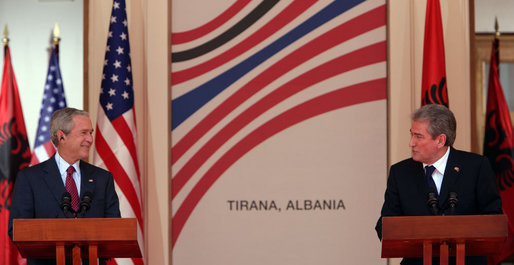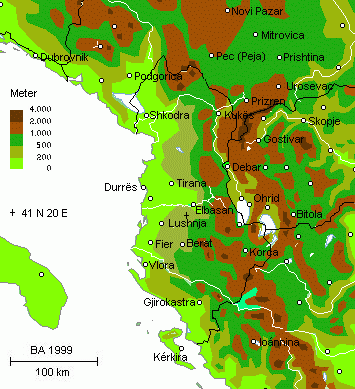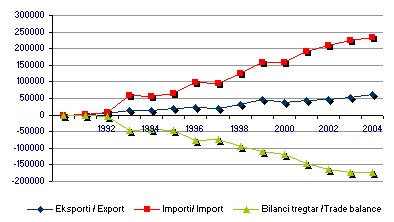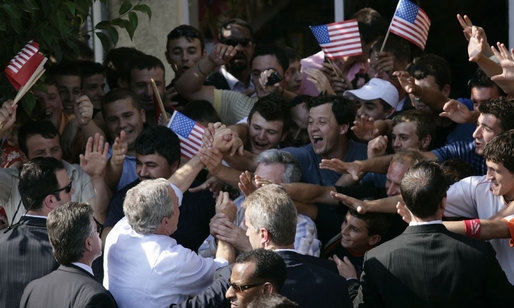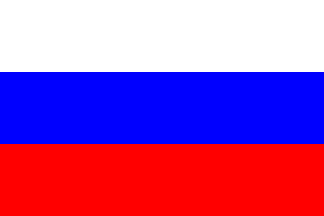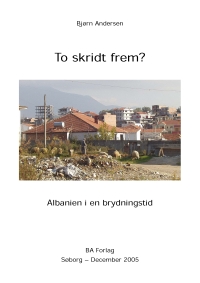II. INTRODUCTION
After the end of the North Atlantic Treaty Organization (NATO) bombing campaign in 1999, the Kosovo Serbs that remained in Kosovo did not immediately recognise the newly-established United Nations Interim Administration Mission in Kosovo (UNMIK). Different factors such as limitations on lack of freedom of movement contributed to the de facto perpetuation of the Serbian administration. In Kosovo Serb inhabited areas structures such as courts, schools and hospitals continue to answer directly to Belgrade thus operating in parallel to the UNMIK administration.
In this report, the general term parallel structures is used to define bodies and institutions that have been or still are operational in Kosovo after 10 June 1999 and that are not mandated for under the United Nations Security Council Resolution 1244. In the majority of cases, these institutions operate under the de facto authority of the Serbian government and assert jurisdiction over Kosovo from Serbia proper, or operate in the territory of Kosovo. These parallel structures operate contemporaneously with, or sometimes even under the same roof as the Provisional Institutions of Self-Government (PISG) recognized bodies.1 In this regard, it is important to notice that the Kosovo Standards Implementation Plan (KSIP), although legally not binding, required that parallel structures are dismantled or integrated into the PISG.2
The purpose of this report is to describe and analyse the effects of the parallel structures operating in Kosovo and to provide an update of the situation since 2003, when the Organization for Security and Co-operation in Europe Mission in Kosovo (OSCE) last issued a report on parallel structures in Kosovo. Parallel courts, parallel security structures, parallel administrative structures related to property issues, parallel schools and parallel health care facilities are the main issues examined in this report. The report does not purport to cover every activity by the Serbian government in the territory of Kosovo.3
This report is divided into five chapters, each one providing an overview of the current situation and analysing the effects of the parallel structures that existed in 2006 in Kosovo. The OSCE made specific recommendations in 2003 on how to resolve some of the problems related to parallel structures in Kosovo. This report also contains recommendations that take into account the current political situation and the settlement process on the future status of Kosovo.
1 Administrative bodies responsible for property issues, established after 10 June 1999 sometimes recognize UNMIK’s mandate but also operate under the de facto authority of Belgrade. 2 Standard 1 on the Functioning of Democratic Institutions; Actions 1.1 – 1.3 require all PISG and UNMIK to develop a strategy to reduce demand for and dismantle parallel structures and integrate them into PISG structures; to start implementation of a strategy and negotiate with Belgrade on technical issues. 3 For example pensions payable by the Serbian authorities.
III. EXECUTIVE SUMMARY
The existence of parallel structures continues to have a substantial impact on Kosovan society. This report provides an overview of existing parallel structures in Kosovo and is a follow up to the “Parallel Structures Report in Kosovo” issued by the OSCE in October 2003. The OSCE has examined parallel structures in the areas of courts, security structures in northern Kosovo,4 property rights, education and health care in Kosovo, aiming to assess the decisions taken and the services provided by these structures as well as their effects on society.
The OSCE’s findings indicate that the continued existence of parallel structures in these areas is the result of three factors:
- The demand for parallel structures is linked to the continued lack of access by some members of the Kosovo Serb community to UNMIK and PISG services. The entrenchment of mono-ethnic enclaves has reinforced restrictions on the freedom of movement. This has made it very difficult for minority communities to access services, including health care, education and social assistance. It is difficult to envisage a reduction of demand and supply and an integration of these structures without first ensuring the equal access to services for all.
- The continued lack of trust of Kosovo Serbs in UNMIK and the PISG, based on their security perceptions and a feeling that they are being discriminated by the PISG.. The main factors why Kosovo Serbs prefer to use health facilities in their enclaves and in northern Kosovo are reported to be security concerns and a distrust of the quality of services provided by the PISG. Continued and increased efforts have to be made to address these concerns, through more active outreach efforts and more flexible and better service provision arrangements.
- Finally, the political situation and the unresolved status question have been a great obstacle to the integration of parallel structures. Several initiatives have been taken at the local level, and a few more by the international community to start the integration of parallel structures into Kosovo’s governance structure. Yet they did not have a greater impact due to a lack of political will from, and a comprehensive strategy developed by, the main parties concerned. It should be hoped that the ongoing status settlement will allow for agreements on the integration of these structures.
Many of these points are illustrated in the report’s initial chapter on the parallel courts operating in Kosovo. They have been analysed on different occasions and reported on regularly by the OSCE since 1999. The parallel court system, which began in 1999 and continues today, severely hampers the establishment of the rule of law in Kosovo.
4 For the purpose of this Report the reference “northern Kosovo” encompasses the municipalities of Leposavić/Leposaviq, Zvečan/Zveçan, Zubin Potok and the area of Mitrovica/Mitrovicë north of the Ibar River.
UNMIK (and the future international actors) and local authorities in Kosovo must address and resolve the following issues in relation to the court system:
1) The recognition, or non-recognition, of judgments by parallel courts, above all for the period between 1999 and January 2003;
2) The double jeopardy dilemma faced by UNMIK judges and prosecutors in light of parallel court decisions by district courts in Serbia; and
3) The dismantling or integration of the parallel court system.
UNMIK and local authorities in Kosovo have not yet addressed the issue of whether or how to transfer pending cases from parallel courts to UNMIK courts. More importantly, there is no agreement with the Government of Serbia to address and solve the problems arising when parallel Serbian courts assert jurisdiction over cases which fall under the jurisdiction of UNMIK courts. People must be able to obtain judgments that are legally recognized in both Kosovo and Serbia proper.
In its second chapter, the report examines some of the special circumstances pertaining to the security situation in northern Kosovo and illustrates some of these points. Since June 1999, there have been two main entities involved in parallel security in northern Mitrovicë/Mitrovica, the so called “Bridge-watchers,” and the police of the Serbian Ministry of Interior Affairs (Ministarstvo Unutrasnih Poslova – MUP). Their continued presence is, among many other reasons, including the continuing politicisation by local political leaders and Belgrade of criminal incidents,, the result of both the persistence of criminal incidents in the area as well as a lack of popular trust in the efforts of the international community and the PISG to prevent their occurrence. The continued tensions in the North, and ongoing discussions on its position within post-status Kosovo, limited the amount of information that could be collected on parallel security structures for this report.
The effects of parallel structures affecting property rights, access to education and access to health care raise additional issues. When looking at property rights it is alarming to notice the detrimental influence of parallel structures on the realisation of this right; ultimately this can lead, and has led, to loss of property for private individuals. As for education, Kosovan children of different backgrounds do not receive the same education because of the existence of two school systems with different curricula. In the past years, authorities have allowed separate structures to develop rather than address the issue of discrimination when it comes to health care. The PISG needs to create an integrated public service to address the lack of sufficient supply of healthcare and education of the Kosovo Serb community. In addition, segregation in public services and in particular the idea that a community can only be served by members of its own community, must be dealt with and resolved.
In many cases parallel structures operate as a de facto social welfare system. Particularly in healthcare and education where they are overstaffed. According to officials from the UNMIK Department of Civil Administration (DCA), the number of employees in the parallel healthcare system in Prishtinë/Priština servicing about 12,000 people equals the total number of municipal healthcare workers providing services for over 400,000 people. In this regard the additional source of income provided by the parallel structures remains an important factor keeping a large number of Kosovo Serbs in Kosovo.
The complexity of the issue indicates that political will needs to be mobilized on all sides for the development of a comprehensive strategy which is required for the integration of parallel structures. This strategy should systematically address the parallel demand and supply sides of service provision, and develop tools of policy enforcement.
Simply closing down parallel structures dealing with health care and education is not an acceptable solution. The final aim should be the comprehensive inclusion of the existing parallel public services into a unified system. The OSCE has compiled a set of recommendations to the PISG as well as the international community, particularly to UNMIK and its potential successor.
![]()
![]()
